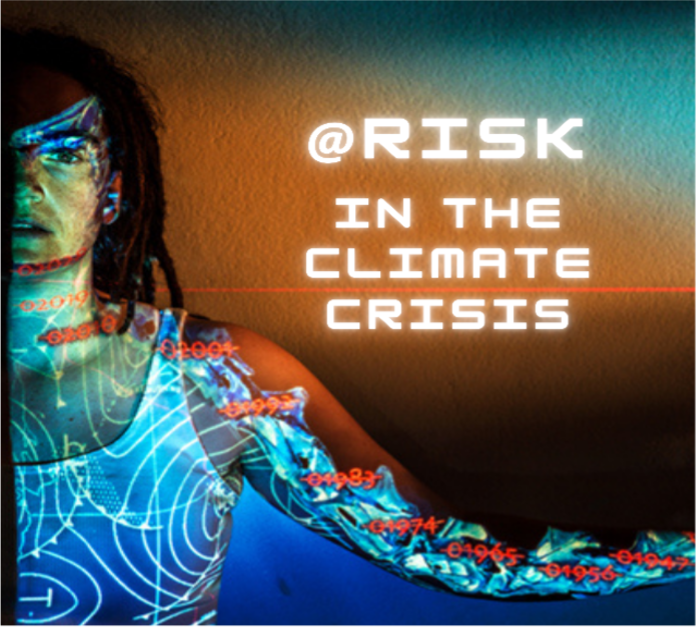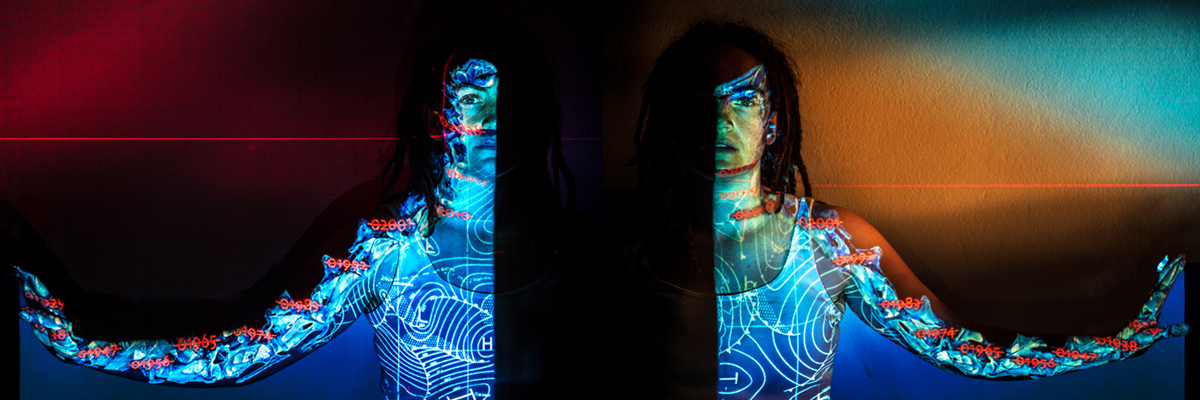At Risk in the Climate Crisis
At Risk in the Climate Crisis
We are learning to live with a world that is seemingly perpetually at risk of everything nowadays, where responses are time sensitive, with consequences extending far beyond human domains, and throughout the more-than-human world. ‘At Risk in the Climate Crisis’ is both a Podcast Series and Symposium addressing the profound differences in knowledge practices around the unfolding climate crisis, and how any environmental action could, or should, respond, given the layered, multi-nodal risks involved. What is at risk? Whose risks matter? What knowledge do we need to effect change? How can we do better together from our diverse positions and situations? What are the personal and professional risks involved?
Symposium
25 February 2022, 9am-4:30pm AEDT
Institute for Culture and Society, Western Sydney University
Keynote Speakers: Prof Katerina Teaiwa (opens in a new window) (ANU) and Prof Juan Salazar (opens in a new window) (WSU)
Established and emerging scholars interrogate what is at risk and how do we respond to the unfolding climate crisis. Presentations from David R. Cole, Nanda Jarosz, Tema Milstein, Julie Vulcan, Maud Quinzin, Jessica Weir, Christopher Lean, Rachel Ankeny, and Josh Wodak.
Click here (opens in a new window) to see the full program.
Click here (opens in a new window) for the symposium booklet.
The symposium has been held on zoom on February 25, 2022. We sincerely thank all presenters and participants, as well as our sponsors and partners. Symposium co-conveners: Jessica Weir and Josh Wodak; symposium coordinator: Daniele Fulvi
Podcast Series
 Subscribe and listen now! Available on Spotify (opens in a new window) and Anchor (opens in a new window) and all other streaming platforms
Subscribe and listen now! Available on Spotify (opens in a new window) and Anchor (opens in a new window) and all other streaming platforms
Leading thinkers from around the world talk about living on the brink of the climate crisis. How are we learning to live with loss and yet keep caring? How can we ditch denialism? What potentials and pitfalls arise from seeking action through technoscientific interventions? Why is Indigenous leadership important? We are all in this together, so come with us to gain a greater understanding about how thought leadership empowers material action.
Amongst 17 distinguished guests you'll hear from: Tony Birch, Nigel Clark, Michael Gillings, Lesley Head, Natasha Fjin, Cameron Muir, Ron Reed and Carolyn Smith. Former ABC radio host and environmental communicator, Gretchen Miller, invites a deep and personal dive into the impact of the climate crisis on our psyches, as we feel our way forward in uncertain and turbulent times.
Podcast team: Executive producers and editors Josh Wodak and Jessica Weir, engineer Judy Rapley, production assistant Daniele Fulvi and writer and producer Gretchen Miller. Fleshfooted shearwater sound recorded by Eddy Smith, via Xeno Canto
Episode 1: Loss and Care
Episode Description
In this episode, we dive into how the climate crisis is playing out locally and across the globe, and what that teaches us about our connection to the earth and each other. Our guests take us from the Birrarung River in southern Australia to the Mongolian Steppe, and to visit the shearwaters feasting on plastic on Lord Howe Island. There are many lives at risk, including our own, and there are navigational tools to not just track our interdependent fates, but to find ways to keep caring in the face of so much loss.
Episode Guests
Nigel Clark is Professor of Human Geography at Lancaster University. His research focuses on the ethical and political implications of inhabiting a physically turbulent planet, and he has recently published articles on natural catastrophes, inter-species encounters, climate change, complexity and cosmopolitanism.
Dr. Cameron Muir is a Postdoctoral Fellow at the Australian National University and National Museum of Australia. He writes about environment and social justice and recently co-edited a book with Kirsten Wehner and Jenny Newall called Living with the Anthropocene: Love, loss and hope in the face of environmental crisis (NewSouth)
Dr. Natasha Fijn is an ethnographic researcher and observational filmmaker based at the ANU Mongolia Institute. Her ongoing interest is in cross-cultural perceptions and attitudes towards other animals, as well as the use of the visual, particularly observational filmmaking, as an integral part of her research.
Professor Tony Birch is an Indigenous Australian author, academic and activist. He has published several novels, including the bestselling The White Girl; Ghost River, which won the Victorian Premier’s Literary Award for Indigenous Writing; and Blood, which was shortlisted for the Miles Franklin Award.
Episode 2: Ditching Denialism
Episode Description
The powerful ‘inhuman’ forces in global heating can be overwhelming, but there are also powerful human forces that can be addressed. In this episode we examine the socio-political influences that support climate denialism and consider how risk itself is understood. We follow the recent history that led to the current ‘normality’ of Western liberal democracies – the way many of us live, and what we believe – and how global climate institutions can be reformed.
Episode Guests
Professor Lesley Head is a geographer whose research examines human-environment relations, both conceptual and material. Her current focus is on the cultural dimensions of climate change and sustainability issues. She is Head of the new School of Geography at the University of Melbourne and President of the Australian Academy of the Humanities.
Dr. Adam Lucas is a senior lecturer in science and technology studies in the School of Humanities and Social Inquiry and is currently Academic Program Director for the Bachelor of Arts at the University of Wollongong. He is particularly interested in processes of technological and organizational innovation. An active union member, he is committed to social and environmental justice, including greater transparency and accountability in university decision-making.
Dr. Jeremy Walker is Senior Lecturer in Environment, Culture and Society in the Social and Political Sciences Program of the School of Communications at UTS. His research focusses on the history of neoliberal economic theory and government in relation to energy and climate change. He is currently serving as co-director of the Climate Justice Research Centre (UTS).
Episode 3: Technoscientific Interventions
Episode Description
As the prospect of irreversible climate change becomes tangible, serious consideration is given to technoscience to lessen the likelihood of this happening. What's to gain and what's at risk when technoscience is authorised to manipulate the ecosystem on such a scale? From micro and synthetic biology to earth systems and climate engineering, in this episode we're considering some of the new science that perhaps – just perhaps – might help with the unfolding climate crisis.
Episode Guests
Michael Gillings is Distinguished Professor of Molecular Evolution in the Department of Biological Sciences at Macquarie University. In general, his interests focus on genetic diversity and its role in evolution. He is internationally recognized for his pioneering work on the evolution and dissemination of antibiotic resistance, and for his research on the new geological era of the Anthropocene, precipitated by human effects on planetary systems. He contributes regularly to radio, television and on-line forums.
Dr. Hugh Goold is a Postdoctoral Fellow at the Department of Primary Industry, NSW. His main research focus is on the agricultural aspects of synthetic biology. His research interests also include yeast molecular biology, and plant and microalgal biotechnology
Dr. Melinda Coleman is a Principal Research Scientist with Regional NSW, Department of Primary Industries, whose research is transforming management and protection of kelp forests. Importantly, Melinda’s research has real-world impact. In a global first, Melinda and her colleagues successfully restored lost underwater forests to the Sydney coast, winning a “green globe” award for environmental protection and saving NSW an estimated $1M per km of coastline restored per/year. As part of a global research team, Melinda pioneered a new restoration technology (“green gravel”) which overcomes extant challenges in underwater restoration.
Aaron Tang is an interdisciplinary PhD Scholar investigating the governance of climate altering technologies that draw down greenhouse gases from the atmosphere and reflect solar energy away from the Earth (also known as climate engineering). He also explores the possible global catastrophic effects of these technologies. This focuses on systemic interactions and low probability high impact scenarios of future deployments.
Episode 4: Indigenous Leadership
Episode Description
Is Indigenous leadership a pathway of possibility to grapple with what is at risk? In this episode Indigenous and non-Indigenous scholars in Australia and North America share how it relates to the environmental crisis and the expert evidence generated by universities. Even though it is often treated as a cultural divergence from the real work at hand, Indigenous leadership offers insight into not just the term ‘environment’, but also how knowledge itself is understood and valued. This is fundamental framing work about what matters and what should be done about it, that is often missing from responses to the climate crisis.
Episode Guests
Dr. Sibyl Diver is a Lecturer in Earth System Programs at Stamford University. Sibyl is an interdisciplinary environmental scientist doing community engaged research on Indigenous water governance, primarily in Pacific Rim salmon watersheds. She spent more than ten years partnering with tribal managers at the Karuk Tribe Department of Natural Resources (California, US), and have also worked with members of the Xaxli’p Community Forest (British Columbia, Canada). She is also engaged in multiple collaborations involving Indigenous and allied scholars.
Dr. Carolyn Smithis the Du Luuk Youth Program Coordinator at the Northern California Indian Development Council, and a traditional basketweaver and artist. She is a member of the UC Berkeley Native American Advisory Council, the California Indian Studies Scholar Association, board member for the California Indian Museum and Cultural Center, and co-founder of the High Ground Arts Center.
Ron Reed is a cultural biologist, dip net fisherman and tribal elder of the Karuk tribe of California. He is a spokesperson for Indigenous environmental justice with federal agencies and in the academy and is a co-founder of the Karuk-UC Berkeley Collaborative. Ron develops plans for eco-cultural revitalization, leads youth cultural education camps, and fosters collaborative research at the nexus of traditional ecological knowledge and western science. Ron plays a critical role in increasing public awareness about the impacts of colonization on the spiritual and physical health of his people and on the ecological integrity of the Karuk ancestral lands.
A/Prof. Kim Cunio Head of the School of Music at the Australian National University (ANU), is an activist composer interested in old and new musics and the role of intercultural music in making sense of our larger world.
Kate Harriden is a wiradyuri woman and an advocate of multidisciplinary and transdisciplinary research. She is undertaking a PhD investigating how Indigenous water science can contribute to improved urban water quality outcomes, by retrofitting storm water channels using Indigenous frameworks and methods.
Thanks!
Josh Wodak and Jessica Weir
@RISK Symposium co-conveners
@RISK Podcast Series executive producers and editors
Josh Wodak and Jessica Weir initiated, co-led and co-created ‘At Risk in the Climate Crisis’ to showcase thought leadership expertise in climate change debates that are traditionally presumed to be an issue and problem of the natural sciences. For the Podcast Series they invited 17 speakers from Australia, the US and UK to speak to particular episodes, writing a briefing paper for each podcast episode outlining the desired content and approach for producer Gretchen Miller, and then worked collaboratively as editors to finesse each podcast. We are delighted with the results and thank our team and funders for making it all possible.
@RISK is funded by The Seed Box – A Mistra-Formas Environmental Humanities Collaboratory and the ARC Centre of Excellence in Synthetic Biology, and is supported by the Institute for Culture and Society, WSU.

Image: >2 degrees of separation <2028: Moira vs <2 degrees of separation <2028: Moira, Josh Wodak, 2011





